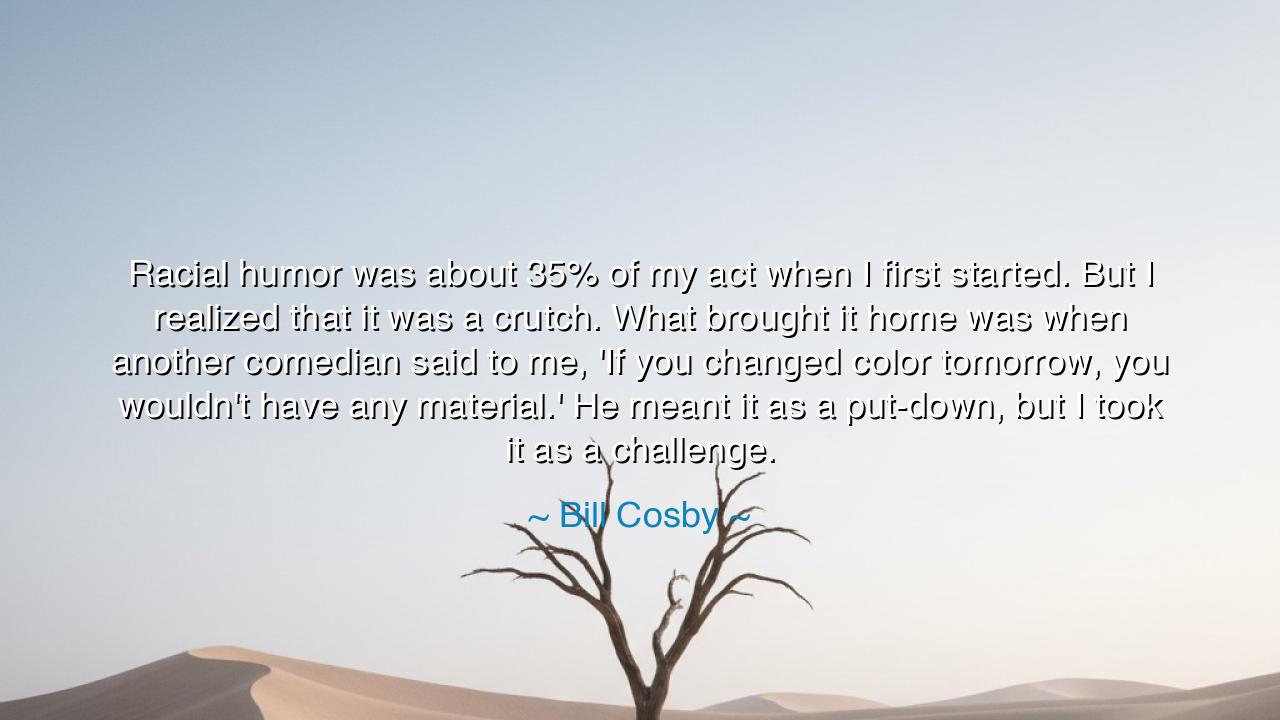
Racial humor was about 35% of my act when I first started. But I
Racial humor was about 35% of my act when I first started. But I realized that it was a crutch. What brought it home was when another comedian said to me, 'If you changed color tomorrow, you wouldn't have any material.' He meant it as a put-down, but I took it as a challenge.






Hear the words of Bill Cosby, spoken not from pride, but from the fire of self-discovery: “Racial humor was about 35% of my act when I first started. But I realized that it was a crutch. What brought it home was when another comedian said to me, ‘If you changed color tomorrow, you wouldn’t have any material.’ He meant it as a put-down, but I took it as a challenge.” Within these words lies a truth that all who create, who speak, who strive to rise, must one day confront—the truth that identity is not the same as substance, and that true mastery is born not from the comfort of what we are, but from the courage to transcend it.
In the dawn of his career, Bill Cosby stood as a young comedian navigating a world still bound by divisions of race and prejudice. To laugh, to make others laugh, was to claim power over pain—to turn history’s weight into the feather of wit. Yet, even in laughter, he felt the whisper of dependence—the knowledge that his art leaned too heavily on one narrow pillar: the color of his skin. When that fellow comedian mocked him, it was not merely insult—it was revelation. For in those words, Cosby saw a mirror: that his gift, though shining, was still chained. To be told, “You would have no material if you changed color,” was to face a truth that no artist can flee—that true art must stand independent of circumstance.
The ancients would have called this the moment of awakening—when a craftsman realizes that the foundation of his work must rest not upon the accidents of birth, but upon the eternal pillars of human experience. Racial humor, though powerful in its time, was a fleeting fire—it entertained, but it confined. To build his craft upon it would be to limit his reach, to speak only to the few and not to the many. Thus, Cosby chose the harder road: he turned away from the easy laughter born of division, and sought instead the universal heartbeat of humanity. He became the chronicler of everyday life, of fathers and children, of schoolrooms and families—the laughter that binds, not the laughter that divides.
Consider the story of Paul Laurence Dunbar, the poet who once wrote, “We wear the mask that grins and lies.” Dunbar understood, as Cosby did, the tension between identity and universality—between speaking as one’s self and speaking for all. Many African American artists of his time were told to perform only through the lens of race, yet Dunbar sought to write of the heart itself—its loneliness, its love, its longing. Like Cosby, he refused to let the world’s label define the limits of his art. His work became timeless, because he dared to see himself not only as a man of color, but as a soul among souls, part of the great human choir.
The words of Cosby thus teach not merely of comedy, but of growth. Every artist, every worker, every dreamer must face the temptation of the crutch—the thing that makes us comfortable but keeps us small. It may be identity, habit, talent, or fear. Yet when we cling too tightly to one dimension of ourselves, we imprison the rest. The wise do not seek only to play to their strengths; they seek to expand them, to transform limitation into mastery. The insult that sought to wound Cosby became his forge—it burned away dependency and left only strength.
There is power in taking offense and turning it into resolve. The weak man hears insult and answers with bitterness; the strong man hears it and answers with creation. Bill Cosby took what was meant as mockery and made of it a vow—to become a comedian whose laughter transcended skin, era, and circumstance. In doing so, he walked the path of the masters—those who refuse to be defined by what others see, and instead reveal what lies unseen within.
Let this, then, be the lesson to those who listen: Do not build your art—or your life—on what is easiest or most obvious. Build it on what is true, on what endures when circumstance changes. Ask yourself, “If the world stripped away what I am known for, what would remain?” Seek to strengthen that. Whether you are an artist, a thinker, or a dreamer, do not lean on what you are born with—build upon it. Use every insult, every limit, as a challenge, not a chain.
For in the end, the measure of greatness is not what we use to rise, but what we outgrow. When the crutch is cast aside, the soul learns to walk on its own—and in that stride lies immortality.






AAdministratorAdministrator
Welcome, honored guests. Please leave a comment, we will respond soon